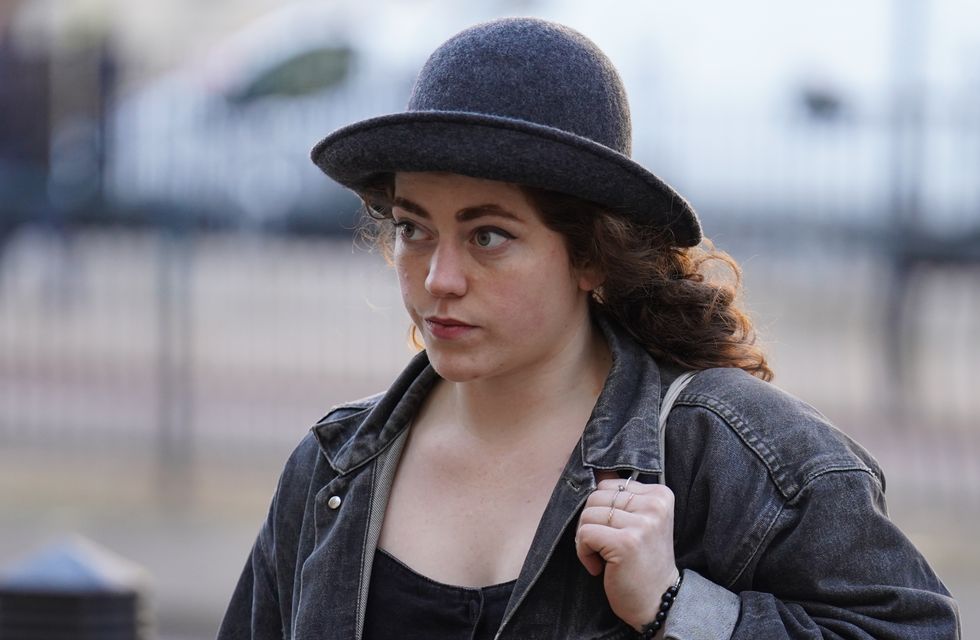The protesters have been found guilty of causing just under £2,000 of criminal damage
Don't Miss
Most Read
Trending on GB News
A climate activist who glued himself to a Vincent Van Gogh painting suggested the artist may have agreed with his demonstration – before comparing his actions to Martin Luther King.
Just Stop Oil supporters Emily Brocklebank, 24, and Louis McKechnie, 22, have been found guilty of causing just under £2,000 of criminal damage to the picture’s frame.
Jonathan Bryan, prosecuting, said the activists used super glue to attach themselves to Van Gogh’s 1889 work Peach Trees In Blossom at the Courtauld Gallery, on the Strand, on June 30.
Just Stop Oil protesters, Emily Brocklebank, 23 and Xavier Gonzales-Trimmer, 21, leave Westminster Magistrates' Court in London.
James Manning
Sentencing the pair at Westminster Magistrates’ Court on Tuesday, District Judge Neeta Minhas said: “An 18th century frame which is hundreds of years old has been permanently damaged.
“It is not in a state where it can return to its original state.”
She added: “The painting has significant, historical and art value and I consider the damage to be substantial.
“It is not minor, insignificant, temporary or trivial.”
She continued: “I find you both guilty of criminal damage, having no lawful excuse to cause damage but you did so on a reckless basis.”
Giving evidence, McKechnie had argued: “I believe that a completely logical person who is not a psychopath who owns a painting of this value by Vincent Van Gogh would have respected the artist’s wishes.
“He said himself that the art of nature is not as valuable as nature itself.”
Francesca Cociani, defending the pair, said McKechnie believed an owner who “respected the wishes of the painter” would have “consented to minor damage”.
The judge did not allow her to ask the defendant if he thinks the painter would agree with the cause.
Mr Bryan said in response: “Van Gogh may have agreed with your actions but we don’t know because we can’t ask him.”
James Manning
Asked if the protests were receiving public support, McKechnie said: “In 1960, Martin Luther King was the most hated man in America.
“The civil rights movement still worked.
“It’s not a popularity contest – people don’t have to like what we’re doing.”
CCTV footage showed the activists walking in the building at about 3.30pm after purchasing tickets for an exhibition.
They then took off their jackets to reveal orange Just Stop Oil T-shirts and attached themselves to the artwork.
Mr Bryan said: “They waited until the coast was clear, when the gallery attendants looked away or were perhaps distracted by another member of the group.”
The prosecutor said: “These actions did in fact cause criminal damage”.
He said the painting, which is worth “millions”, was not damaged but the “valuable” frame was.
Mr Bryan added: “The defendants say they were expressing their rights, under the European convention… to freedom of expression… and of assembly.
“They say the exercise of those rights gives them a lawful excuse.
“But these are qualified rights, not absolute rights.”
Ms Cociani questioned Karen Serres, a curator at the gallery.
She said: “It’s possible that this very painting has now increased in value because of the protest it was subject to by the defendants.
“Say the institute was to sell it on in 20 to 30 years, is it possible its value would now increase?”
Ms Serres replied: “Absolutely not.”
The witness said she believes the painting cannot be sold.
Ms Serres told the court it took three hours for the activists to be removed, with the incident lasting until after closing time.
She said: “There were concerns over how much of the glue had seeped into the frame and the painting itself.”
There were also worries about the solvent used by police to remove the activists, the court heard.
Ms Serries said the frame, worth around £20,000, dates back to the 18th century.
She said: “There were large areas of glue left behind and areas of solvent which had seeped into the gilding of the frame.
“Parts of the frame had fallen off.”
Ms Serres said it took six hours for the painting to be removed from the frame and put back again.
Brocklebank, a student, told the court: “When it comes to protesting, just speaking does not get a platform.
“By gluing, it gives a story which the media chooses to follow.”
She added: “I didn’t think I would cause much damage. Glue comes off.”
The defendant said the painting’s owner would have “consented” to the protest.
She said: “Any good human would agree with trying to sustain life on Earth.”
Brocklebank, from Yeadon, Leeds, who appeared in person, and McKechnie, from Weymouth, Dorset, who appeared in custody from HMP Peterborough, had denied the charges.
Ms Cociani said the damage was “trivial”, adding it was “not unreasonable” for them to carry out the protest given how much damage they expected to cause.
McKechnie was jailed for three weeks.
Brocklebank received a 21-day sentence, suspended for six months.
She was given an electronically monitored six-week curfew.
Xavier Gonzales-Trimmer, 21, originally faced the same charges after being accused of “distracting the guards” – but they were dropped.
However, he was fined for failing to appear at the court for a first hearing.










